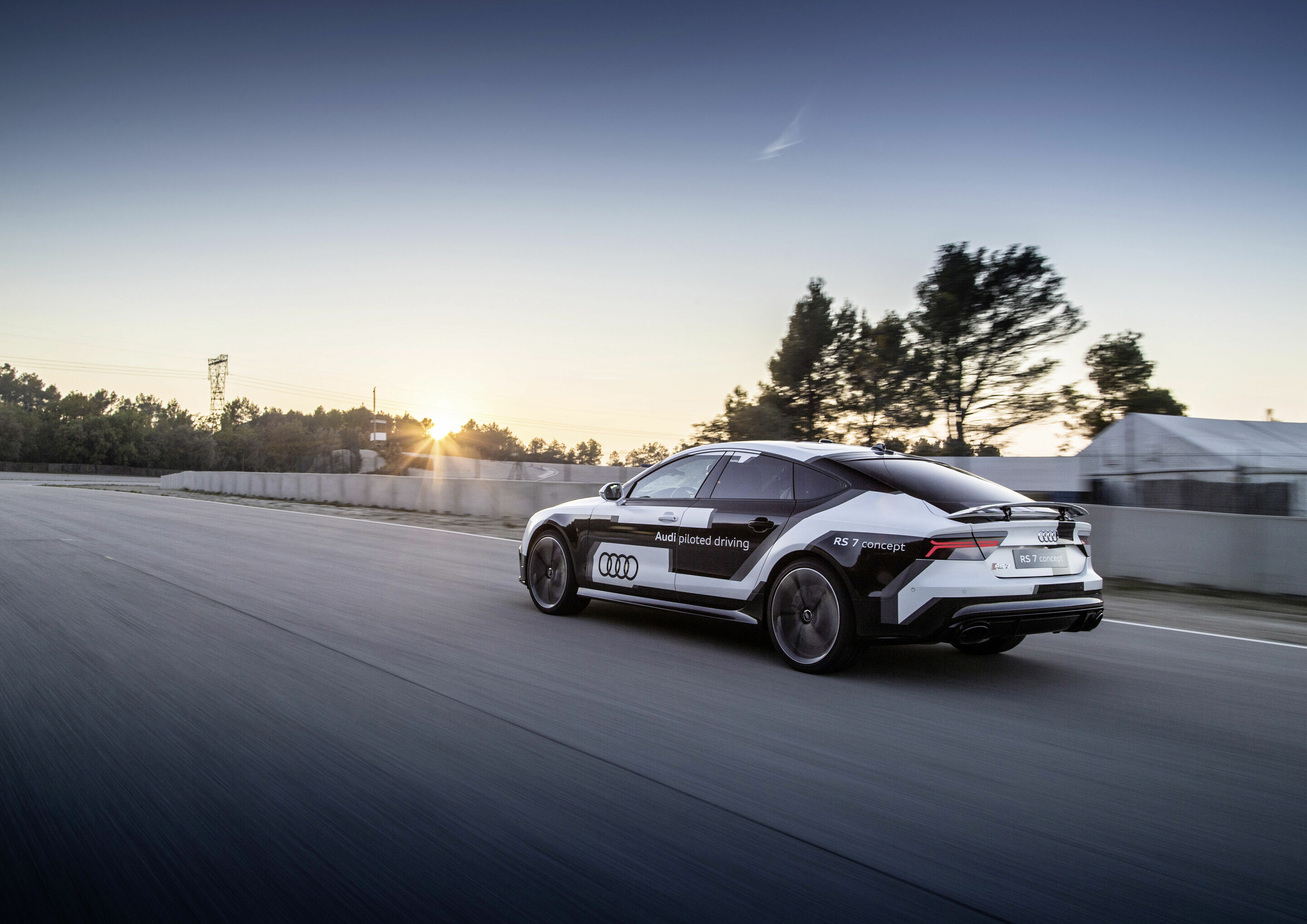Audi RS 7 piloted driving concept drives autonomously in record time on race track in Spain
- Test drives with international journalists
- Top lap times on FAST Parcmotor Racetrack in Spain
The Audi RS 7 piloted driving concept has once again driven to record times – autonomously and without any interventions by the driver. At the challenging FAST Parcmotor race track near Barcelona in Spain, Audi demonstrated its technological competence in piloted driving. Passengers were international journalists who had an opportunity to experience the latest generation of the high-powered, four-door sport coupe under race conditions.
At its second race course appearance this year in Sonoma, California, Audi trimmed the weight-reduced RS 7 for even higher performance. “Under challenging conditions on various international race courses, we are acquiring important experience in tuning our piloted functions at performance limits. Of course, this benefits development of our production assistance systems such as collision avoidance assist in the new Audi A4,” says Thomas Müller, who is responsible for the development of braking, steering and driver assistance systems at Audi. “Each race track is different and presents new challenges for us. We use the knowledge we gain to enhance the robustness and performance of our test vehicle. This has resulted in excellent lap times with a best lap time of 2:07.67 minutes for the 4.2 km (2.6 mi) long course.”
For some time now, Audi has been testing piloted driving under increasingly challenging conditions. In October 2014, an RS 7 with the project name “Bobby” already completed a driverless lap of the Hockenheimring at speeds of up to 240 km/h (149.1 mph). The current generation of the car is named “Robby,” and is powered by a 4.0 TFSI V8 biturbo engine with a power output of 412 kW (560 hp). Robby is around 400 kg (881.8 lb) lighter than the previous model. In July 2015, Robby had already thrilled the American public when it drove on the Sonoma Raceway in California without an active driver, turning in lap times that were better than those of sports car drivers.
Whether it is braking, steering or accelerating, the piloted car controls all driving functions – fully automated and with high precision. Audi is also testing piloted driving in the challenging situation of real road traffic. In early 2015, “Jack” – an Audi A7 piloted driving concept car – autonomously drove the 900 km (559.2 mi) route from Silicon Valley to Las Vegas with journalists aboard. Shortly thereafter, this car also drove autonomously at speeds of up to 130 km/h (80.8 mph) on German autobahns. At CES Asia in May 2015, journalists experienced piloted driving in the complex traffic of mega-city Shanghai. And in October 2015, Audi demonstrated automatic emergency evasive maneuvers of a test vehicle with moving obstacles in the urban environment.
The development work, which includes driving on a very wide array of testing grounds, is yielding valuable knowledge for series-production systems – from sensor technology and data processing to vehicle control and stabilization.
Audi technologies for piloted driving stand for the principles of safety, time savings, efficiency and convenience. The systems can make a valuable contribution toward safety, especially when the driver is overwhelmed or underwhelmed by driving tasks. When used to temporarily assume driving tasks, the predictive technology makes driving more efficient, reduces stress and enhances comfort. In addition, it gives drivers greater freedom for organizing their time in the car. Piloted driving will make its production debut in the next generation of the luxury-class sedan, the Audi A8. The systems can assume driving tasks during parking or in stop-and-go traffic on freeways at speeds of up to 60 km/h (37.3 mph).
Further information is available here: Link
Fuel consumption of the models named above:
Audi RS 7 Sportback
Combined fuel consumption in l/100 km: 9.5 (24.8 US mpg);
Combined CO2 emissions in g/km: 220 (354.1 g/mi)

